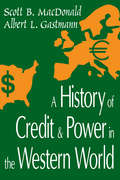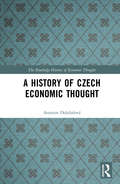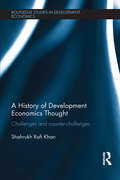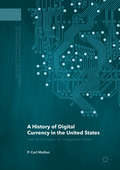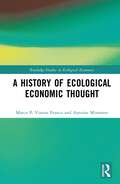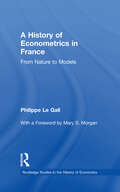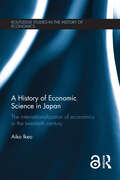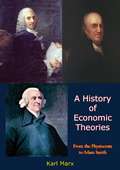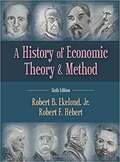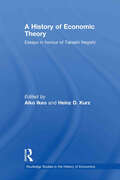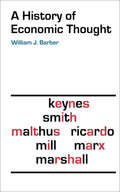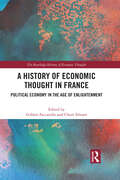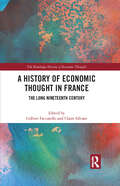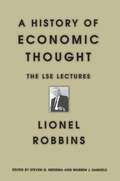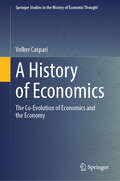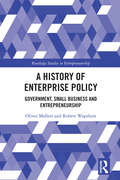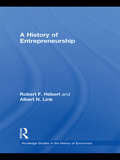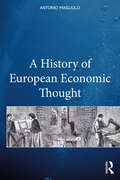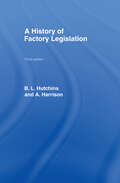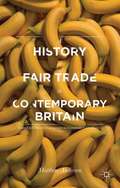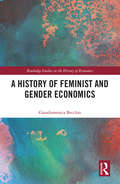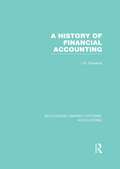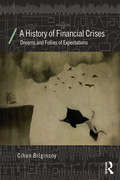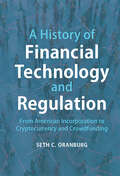- Table View
- List View
A History of Credit and Power in the Western World
by Scott B. MacDonaldThe end of the Cold War put the planet on a new track, abruptly replacing the familiar world of bipolarity, red phones, and intercontinental ballistic missiles with the strange new world of the Internet, e-commerce, and Palm Pilots. The "New World Order" was defined by a U.S.-led war against Iraq, bloody ethnic strife in Bosnia and Rwanda, and religious turmoil in Central Asia. This evolving global system, however, overlooked the powerful role of credit, which functions as a critical building block for developing greater national and individual wealth. This volume examines the evolution of credit in the Western world and its relationship to power. Spanning several centuries of human endeavor. it focuses on Western Europe and the United States and also considers how the Western system became the global credit system. Six major themes run throughout: (1) the direct relationship between credit and power; (2) different kinds of political power promote different kinds of economic behavior; (3) various societal and cultural groups were often more successful in mingling credit and political power; (4) the Western credit system evolved in tandem with the development of the nation-state; (5) historically, there has been a pattern of financial crises; (6) credit spread from being the privilege of the wealthy and powerful to being available to vast numbers. MacDonald and Gastmann have broken history into five periods, ranging from early pre-modern, defining the earliest references to banking and credit as exemplified by the Code of Hammurabi, circa 1726 BC, through the Roman Empire with its creation of money and growing use of credit in trade, the barbarian invasions of the 11th century which led to a breakdown in credit networks in the West, through the establishment of the Italian city-states, to the modern period which incorporates the rise of credit in the Low Countries in the 1500s and extends through the rise of London and New York as the major international credit hubs.
A History of Czech Economic Thought (The Routledge History of Economic Thought)
by Antonie DoležalováSituated in the turbulent heart of Europe, the Czech Republic has suffered from significant discontinuity in its historical development, but its economic thinking has not until now been subject to a full analysis. This book offers a history of Czech economic thought from the late Middle Ages to the present day. It traces methodological developments and the relationship between economics and politics, and introduces not just pioneering figures in the field but also those whose lives and careers were thwarted by history, as well as Czech exile thinkers. Identifying key themes in Czech economic thought, the volume considers which branches of economic theory have had the greatest influence on Czech thought, and explores the relationship between Czech economic thinking and wider established schools of thought. This book will benefit students and researchers of history of economic thought, economic history, economic theory, and political economy, as well as those with a specific interest in the Czech Republic.
A History of Development Economics Thought: Challenges and Counter-challenges (Routledge Studies in Development Economics #109)
by Shahrukh Rafi KhanThis book explores the history of economic development thought, with an emphasis on alternative approaches in macro development economics. Given that the pioneers of development economics in the 1940s and 1950s drew inspiration from classical political economists, this book opens with a review of key classical scholars who wrote about the progress of the wealth of nations. In reviewing the thinking of the pioneers and those that followed, both their theories of development and underdevelopment are discussed. Overall, the book charts the evolution of development economic thought from the early developmentalists and structuralists, through to the neo-Marxist approach and radical development theory, the neo-liberal counter revolution, and the debate between new developmentalists and neo-liberal scholars. It ends with an assessment of the state of the field today. This book will be of interest to all scholars and students interested in the evolution of development economics.
A History of Digital Currency in the United States: New Technology in an Unregulated Market (Palgrave Advances in the Economics of Innovation and Technology)
by P. Carl MullanThis book presents detailed case studies of the first commercial internet digital currency systems developed between 1996 and 2004. Transactions completed with the new technology circumvented all US financial regulations, an opening that transnational criminals exploited. Mullan explains how an entire industry of companies, agents, and participants turned a blind eye to crimes being committed in this unsupervised environment. He then tracks the subsequent changes made to US regulations that now prevent such unlicensed activity, illustrating the importance of supervising products and industries that arise from new disruptive technology. This book distills hundreds of hours of interviews with the creators and operators of early digital currency businesses to create detailed case studies of their practices.
A History of Ecological Economic Thought (Routledge Studies in Ecological Economics)
by Marco P. Vianna Franco Antoine MissemerContributing to a better understanding of contemporary issues of environmental sustainability from a historical perspective, this book provides a cohesive and cogent account of the history of ecological economic thought. The work unearths a diverse set of ideas within a Western and Slavic context, from the Renaissance and the Enlightenment to the late 1940s, to reveal insights firmly grounded in historiographical research and of import for addressing current sustainability challenges, not least by means of improving our grasp on how humans and nature can generously coexist in the long term. The history of ecological economic thought offered in this volume is rich and diverse, encompassing views that are bound by the observance of the tenets of the natural sciences, but which differ significantly in terms of the role of energy and materials to cultural development and the normative aspects involving resource distribution, social ideals, and policy-making. Combining the approaches of independent scholarly figures and scientific communities from different historical periods and nationalities, the book brings elements that are still missing in the scarce literature on the history of ecological economic thought and highlights the underlying threads which unite such initiatives. The book brings a fresh look into the historical development of ecological economic ideas and will therefore be of great interest to scholars and students of ecological economics, environmental economics, sustainability science, interdisciplinary studies, and history of economic thought.
A History of Econometrics in France: From Nature to Models (Routledge Studies In The History Of Economics Ser.)
by Philippe Le GallThis text challenges the traditional view of the history of econometrics and provides a more complete story. In doing so, the book sheds light on the hitherto under-researched contribution of French thinkers to econometrics. Fascinating and authoritative, it is a comprehensive overview of what went on to be one of the defining subsets within t
A History of Economic Science in Japan: The Internationalization of Economics in the Twentieth Century (Routledge Studies in the History of Economics)
by Aiko IkeoJapanese economists began publishing scientific papers in renowned journals including Econometrica in the 1950s and had made their significant contributions to the sophistication of general equilibrium analysis by intensive use of a variety of mathematical instruments. They had contributed significantly to the transformation of neoclassical economics. This book examines how it became possible for Japanese economists to do so by shedding light on the "professional" discussion of the international gold standard and parity policies in the early twentieth century, the acceptance of "mathematical economics" in the following period, the impact of establishment of the Econometric Society (1930), and the swift distribution of theory-oriented economics journals since 1930. This book also includes topics on the historical research of the Japanese foundations of modern economics, the transformation of the economics of Keynes into Keynesian economics, Japanese developments in econometrics, and Martin Bronfenbrenner's visit to Japan in the post-WWII period. This book provides insight into the economic research done by Japanese scholars in the international context. It traces how, during the period 1900-1960, economics was harmonized with economics and a standard economics was re-shaped on the basis of mathematics thanks to economists' appetite for rigor and will help to contribute to existing literature.
A History of Economic Science in Japan: The Internationalization of Economics in the Twentieth Century (Routledge Studies in the History of Economics)
by Aiko IkeoJapanese economists began publishing scientific papers in renowned journals including Econometrica in the 1950s and had made their significant contributions to the sophistication of general equilibrium analysis by intensive use of a variety of mathematical instruments. They had contributed significantly to the transformation of neoclassical economics. This book examines how it became possible for Japanese economists to do so by shedding light on the "professional" discussion of the international gold standard and parity policies in the early twentieth century, the acceptance of "mathematical economics" in the following period, the impact of establishment of the Econometric Society (1930), and the swift distribution of theory-oriented economics journals since 1930.This book also includes topics on the historical research of the Japanese foundations of modern economics, the transformation of the economics of Keynes into Keynesian economics, Japanese developments in econometrics, and Martin Bronfenbrenner's visit to Japan in the post-WWII period.This book provides insight into the economic research done by Japanese scholars in the international context. It traces how, during the period 1900-1960, economics was harmonized with economics and a standard economics was re-shaped on the basis of mathematics thanks to economists' appetite for rigor and will help to contribute to existing literature.
A History of Economic Theories: From the Physiocrats to Adam Smith
by Karl MarxKarl Marx’s History of Economic Theories from the Physiocrats to Adam Smith is Part I of the legendary but previously untranslated Volume IV of Marx’s Capital. Although it was written some ninety years ago, it remained unpublished until the first German edition appeared in 1904. Originally, Marx had intended to prepare the first three volumes for publication, then, from the remaining mass of manuscript, to extract a final volume constituting a history of theories of surplus value. Engels, who became Marx’s literary executor, was unable to follow this plan during his lifetime and assigned the task to Kautsky. Kautsky, however, found it impossible to carry out the project in the form intended. Much of the material indicated by Marx and Engels for inclusion in Volume IV had already been covered, in part at least, in the three preceding volumes. Consequently, the work as it now stands does not follow Marx’s precise plan. It is more comprehensive in scope, deals with economic theories whose relation to surplus value and profit is not immediate, and more closely approaches a complete and critical history of economic theories than the narrower concept which Marx had had in mind.
A History of Economic Theory and Method
by Robert B. Ekelund Robert F. HébertKnown for its clarity, comprehensiveness, and balance, the latest edition of A History of Economic Theory and Method continues that tradition of excellence. <p><p>Ekelund and Hébert's survey provides historical and international contexts for how economic models have served social needs throughout the centuries beginning with the ancient Greeks through the present time. The authors not only trace ideas that have persisted but skillfully demonstrate that past, discredited ideas also have a way of spawning critical thinking and encouraging new directions in economic analysis. <p><p>Coverage that distinguishes the Sixth Edition from its predecessors includes a detailed analysis of economic solutions by John Stuart Mill and Edwin Chadwick to problems raised by the Industrial Revolution; the role of psychology and "experiments" in understanding demand and consumer behavior; discussions of modern economic theory as it interrelates with other social sciences; and a close look at the historical development of the critical role of entrepreneurship, both in its productive and unproductive variants. <p><p> The authors' creative approach gives readers a feel for the thought processes of the great minds in economics and underscores key ideas impacting contemporary thought and practice. Well-crafted discussions are further enriched by absorbing examples and figures. Thorough suggested reading lists give options for more in-depth explorations by interested readers.
A History of Economic Theory: Essays in honour of Takashi Negishi (Routledge Studies in the History of Economics)
by Heinz D. Kurz Aiko IkeoFew economists have been as prolific and wide-ranging as Takashi Negishi. Part of the "Hicksian" generation of Neo-Walrasian general equilibrium theorists, Negishi rose to prominence during the early 1960s with his work on the Neo-Walrasian system. Negishi's signature has been his attempt to extend the multi-market Neo-Walrasian system in several directions to incorporate concerns such as imperfect comptetition, stability, money, trade and unemployment - and, as a consequence, helping to discover and delineate the limits of conventional theory. This collection in honour of Takashi Negishi analyses his contributions to the history of economic theory. Economists paying tribute within this volume include Neri Salvadori, Laurence Moss, and Joaquim Silvestre.
A History of Economic Thought (Blackwell Companions To Contemporary Economics Ser.)
by William J. BarberThis critical study of the development of systematic economic ideas explores them in both historical and contemporary contexts. Many of the issues that faced economists in the past are still with us. The theories and methods of such men as Adam Smith, T. R. Malthus, David Ricardo, J.S. Mill, Karl Marx, Alfred Marshall, and J. M. Keynes are often relevant to us today. As the Great Recession taught us in the first decade of the twenty-first century, the history of economic thought can have wide-ranging practical applications. In this volume, Professor William J. Barber assesses the thought of a number of important economists both in terms of the issues of their day and in relation to modern economic thought. By concentrating on the greatest exponents, he highlights the central properties of the four main schools of economic thought—classical, Marxian, neo-classical, and Keynesian—and shows that although each of these traditions is rooted in a different stage of economic development, they can all provide insights into the recurring problems of modern economics.
A History of Economic Thought in France: Political Economy in the Age of Enlightenment (The Routledge History of Economic Thought)
by Gilbert Faccarello Claire SilvantTraditionally, there has been a long and sustained interest in studying the history of economic ideas in France. Interest appeared to wane after World War II, but in recent decades, there has been a marked renaissance of interest and research in the contributions of French-speaking authors. Drawing on the flow of recent research, this book presents a new assessment of the history of political economy in France incorporating both novel presentations of some traditional subjects and topics that are not usually studied. This first volume deals with the history of political economy in France in the Age of Enlightenment. After presenting a kind of “review of the troops” and some main developments inherited from preceding centuries, the chapters are devoted to P. de Boisguilbert’s foundation of liberal political economy; J. Law’s monetary theory and policy; the many strands of “commerce politique”; the theoretical developments of F. Quesnay and the physiocratic movement; and A.-R.-J. Turgot’s, J.-J.-L. Graslin’s and M.-J.-A.-N. Caritat de Condorcet’s sensationist political economy. The volume then examines some political critiques of liberal political economy and goes on with a study of the first attempts to quantify economic variables and to formalise the economic discourse. It concludes with a chapter on the importance of translations into French of books published abroad, and with the main institutional and theoretical developments which happened during the French Revolution. A History of Economic Thought in France will be invaluable reading for advanced students and researchers of the history of economic thought, political economy, intellectual history and French history.
A History of Economic Thought in France: The Long Nineteenth Century (The Routledge History of Economic Thought)
by Gilbert Faccarello Claire SilvantTraditionally, there has been a long and sustained interest in studying the history of economic ideas in France. Interest appeared to wane after World War II, but in recent decades, there has been a marked renaissance of interest and research in the contributions of French-speaking authors. Drawing on the flow of recent research, this book presents a new assessment of the history of political economy in France incorporating both novel presentations of some traditional subjects and topics that are not usually studied. This second volume analyses the evolution of political economy during the long nineteenth century, combining an assessment of both liberals and their opponents. Its first part covers the most outstanding contributions to political economy in the age of industry, from the founding fathers (L.-C.-C. Destutt de Tracy and J. –B. Say) until the pre-World War I period, including that of A.-A. Cournot, J. Dupuit, the French liberal economists, and L. Walras. The volume then outlines the critiques of liberal political economy, focusing on the analyses of J.-C.L.S. de Sismondi, C.-H. de Saint-Simon and his followers, and the successive generations of socialist and associationist authors, not forgetting the sociological critique. A substantial postlude concludes the volume with a survey of recent developments of French economic thought up to the present day. A History of Economic Thought in France will be invaluable reading for advanced students and researchers of the history of economic thought, political economy, intellectual history and French history.
A History of Economic Thought: The LSE Lectures
by Lionel RobbinsLionel Robbins's now famous lectures on the history of economic thought comprise one of the greatest accounts since World War II of the evolution of economic ideas. This volume represents the first time those lectures have been published. Lord Robbins (1898-1984) was a remarkably accomplished thinker, writer, and public figure. He made important contributions to economic theory, methodology, and policy analysis, directed the economic section of Winston Churchill's War Cabinet, and served as chairman of the Financial Times. As a historian of economic ideas, he ranks with Joseph Schumpeter and Jacob Viner as one of the foremost scholars of the century. These lectures, delivered at the London School of Economics between 1979 and 1981 and tape-recorded by Robbins's grandson, display his mastery of the intellectual history of economics, his infectious enthusiasm for the subject, and his eloquence and incisive wit. They cover a broad chronological range, beginning with Plato, Aristotle, and Aquinas, focusing extensively on Adam Smith, Thomas Malthus and the classicals, and finishing with a discussion of moderns and marginalists from Marx to Alfred Marshall. Robbins takes a varied and inclusive approach to intellectual history. As he says in his first lecture: "I shall go my own sweet way--sometimes talk about doctrine, sometimes talk about persons, sometimes talk about periods." The lectures are united by Robbins's conviction that it is impossible to understand adequately contemporary institutions and social sciences without understanding the ideas behind their development. Authoritative yet accessible, combining the immediacy of the spoken word with Robbins's exceptional talent for clear, well-organized exposition, this volume will be welcomed by anyone interested in the intellectual origins of the modern world.
A History of Economics: The Co-Evolution of Economics and the Economy (Springer Studies in the History of Economic Thought)
by Volker CaspariDiscover the captivating journey of the history of economic thought through the centuries with this comprehensive textbook. From the dawn of economic thought in ancient times to the emergence of modern economic theory in the twentieth century, this textbook reveals the evolution of ideas that have shaped our understanding of economics. Ideal for advanced bachelor's and master's students in economics and related social sciences, this engaging resource illuminates the historical context of economic thought and its impact on real-world developments. It examines influential schools of economic thought, addresses major theoretical challenges, and highlights fundamental innovations that have shaped the development of the discipline. The textbook explores a wide range of topics, including the economic philosophies of ancient civilizations and the Middle Ages, the influence of mercantilism and physiocracy, the profound contributions of Adam Smith, David Ricardo, and Karl Marx to classical political economy, the marginalist revolution and neoclassicism, German historical economics, the evolution of macroeconomics, the rise of Keynesianism, and the enduring relevance of institutional economics. This is a must-read for students and anyone curious about the history of economics and economic history.
A History of Enterprise Policy: Government, Small Business and Entrepreneurship (Routledge Studies in Entrepreneurship)
by Robert Wapshott Oliver MallettGovernments in developed and developing economies have increasingly turned to entrepreneurship and small businesses for economic growth, dynamism and economic and social inclusion. Policies seeking to encourage, support or otherwise influence these forms of economic activity are varied but virtually omnipresent, recommended by organisations such as the OECD and World Bank and implemented by governments of many political ideologies. With a range of activities across government labelled as enterprise policy, it is vital to unpick the different policies, initiatives and interventions and to understand their development in order to subject them to scrutiny and evaluate the actions taken in the name of enterprise. This book provides the first in-depth, historical analysis of enterprise policy in the United Kingdom. Successive UK governments have been particularly active, with the number of initiatives estimated recently at 3000 and expenditure reaching as high as £12bn, yet facing continuous criticisms for its use, value or relevance. This historical study of UK enterprise policy represents a case study of different forms of enterprise policy and how they have developed, or failed to develop, over time, contributing to understanding of government, small business and entrepreneurship. It will be of value to researchers, academics, policymakers, and students interested in the history of small business and entrepreneurship as well as standing as a history of a specific policy area and the ways in which policies involving many different areas of government develop over time.
A History of Entrepreneurship (Routledge Studies in the History of Economics)
by Albert N. Link Robert F HébertThis book establishes a chronological trace of the entrepreneur as treated in economic literature in order to give a more wholesome perspective to contemporary writings and teachings on entrepreneurship. It focuses on the nature and role of the entrepreneur, and of entrepreneurship, as revealed in economic literature as early as the eighteenth century, when Richard Cantillon first coined the term 'entrepreneur'. The authors then trace how Joseph Schumpeter's perspective, among other’s, on entrepreneurship came to dominate the world's understanding of the term. Due to Schumpeter’s dominant influence, entrepreneurship has come to occupy a primary role in the theory of economic development. In this book Hébert and Link discuss various key topics including the German Tradition, the Austrian and the English School of thought as well as individuals such as Alfred Marshall and Jeremy Bentham. The historical survey also illustrates the tension that often exists between "theory" and "practice" and how it has been difficult for economic theory to assimilate a core concept that plays a vital role in social and economic change. Finally, the book exposes the many different facets of entrepreneurship as they have been perceived by some of the great economists throughout the ages.
A History of European Economic Thought
by Antonio MagliuloA History of European Economic Thought grafts the history of economic thought onto Global History by showing how significant economic ideas have influenced the process of Europe’s formation from the very beginning to the present day. This work combines two classical stories that until today have followed parallel paths. On the one hand, there is the political history of Europe, which is often limited to a few fleeting references to the ideas of the great economists of the past. On the other hand, there is the history of economic thought, which examines Europe as a whole, as a distinct supranational community, only with reference to the institutions created after World War II. The volume sheds light on the constitutive values of Europe, which also stem from a particular economic culture, and provides essential reading for students and scholars of the history of economic thought.
A History of Factory Legislation
by Amy Harrison B. Leigh HutchinsFirst Published in 1966. Routledge is an imprint of Taylor & Francis, an informa company.
A History of Fair Trade in Contemporary Britain: From Civil Society Campaigns To Corporate Compliance
by Matthew AndersonThis book offers an original contribution to the empirical knowledge of the development of Fair Trade that goes beyond the anecdotal accounts to challenge and analyse the trading practices that shaped the Fair Trade model. Fair Trade represented a new approach to global trade, corporate social responsibility and consumer politics.
A History of Feminist and Gender Economics (Routledge Studies in the History of Economics)
by Giandomenica BecchioThis book offers a historical exploration of the genesis of feminist economics and gender economics, as well as their theoretical and methodological differences. Its narrative also serves to embed both within a broader cultural context. Although both feminist economics and gender neoclassical economics belong to the cultural process related to the central role of the political economy in promoting women’s emancipation and empowerment, they differ in many aspects. Feminist economics, mainly influenced by women’s studies and feminism, rejected neoclassical economics, while gender neoclassical economics, mainly influenced by home economics and the new home economics, adopted the neoclassical economics’ approach to gender issues. The book includes diverse case studies, which also highlight the continuity between the story of women’s emancipation and the more recent developments of feminist and gender studies. This volume will be of great interest to researchers and academia in the fields of feminist economics, gender studies, and the history of economic thought.
A History of Financial Accounting (Routledge Library Editions: Accounting)
by J. R. EdwardsThis volume deals with the evolution of accounting from earliest times, and gives particular attention to corporate accounting developments since the Industrial Revolution. The author identifies the various sources of accounting practices employed by British companies, to demonstrate the main changes which have taken place, when they occurred and why. The author emphasises the need to understand the legal, social and economic context in which accountancy changes take place, and also studies the conflicts which arise between suppliers and users of accounting statements. The study concludes with an examination of the duties performed by the professional accountant, the extent to which these have changed in the course of time and how his position in society is reinforced by the activities of professional institutions.
A History of Financial Crises: Dreams and Follies of Expectations (Economics as Social Theory)
by Cihan Bilginsoy"Once-in-a-lifetime" financial crises have been a recurrent part of life in the last three decades. It is no longer possible to dismiss or ignore them as aberrations in an otherwise well-functioning system. Nor are they peculiar to recent times. Going back in history, asset price bubbles and bank-runs have been an endemic feature of the capitalist system over the last four centuries. The historical record offers a treasure trove of experience that may shed light on how and why financial crises happen and what can be done to avoid them - provided we are willing to learn from history. This book interweaves historical accounts with competing economic crisis theories and reveals why commentaries are often contradictory. First, it presents a series of episodes from tulip mania in the 17th century to the subprime mortgage meltdown. In order to tease out their commonalities and differences, it describes political, economic, and social backgrounds, identifies the primary actors and institutions, and explores the mechanisms behind the asset price bubbles, crashes, and bank-runs. Second, it starts with basic economic concepts and builds five competing theoretical approaches to understanding financial crises. Competing theoretical standpoints offer different interpretations of the same event, and draw dissimilar policy implications. This book analyses divergent interpretations of the historical record in relation to how markets function, the significance of market imperfections, economic decision-making process, the role of the government, and evolutionary dynamics of the capitalist system. Its diverse theoretical and historical content of this book complements economics, history and political science curriculum.
A History of Financial Technology and Regulation: From American Incorporation to Cryptocurrency and Crowdfunding
by Seth C. OranburgUsing the lens of history, A History of Financial Technology and Regulation illuminates recent changes to the world of finance. With lucid prose and the help of concrete examples, Seth Oranburg helps readers understand the role of technology in finance today, including complex phenomena such as mutual funds, cryptocurrencies, and the stock market itself. Chapters begin with basic principles and historical analogy before describing complex digital-investment strategies and instruments. Readers will also gain an introduction to key concepts in financial regulation, learning how law and regulations prevented some financial crises while perpetuating others. Oranburg concludes with ideas about what's next for finance and how the law should respond. This book will appeal to specialists and nonspecialists alike who are interesting in learning more about business, economics, finance, law, and regulation.
